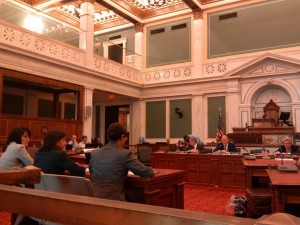UPDATE: September 3, 2014, Mayor Nutter signed the Breastfeeding Accommodation Bill No. 130922 into law, and he quotes WLP Executive Director, Carol Tracy, saying “Philadelphia is the most women friendly city in the USA.”
Earlier Post: Philadelphia City Council Considers Bill to Support Nursing Mothers in the Workplace (June 19, 2014)
By Freya Riedlin, Intern, Women’s Law Project
“I would assume that if men could bear children, we wouldn’t be having this discussion.” – Councilman Kenney

These days, it is common knowledge that breastfeeding provides both infants and mothers with a range of invaluable health benefits. For example, breast milk reduces the risk of Sudden Infant Death Syndrome (SIDS), and reduces the frequency of gastrointestinal infections in babies. For mothers, breastfeeding is associated with a reduction in the incidence of breast and ovarian cancer.
Because of these health benefits, the World Health Organization recommends exclusive breastfeeding for the first six months of a child’s life. But many mothers return to the workplace before their child reaches six months of age. Consequently, working mothers who breastfeed must express milk in the course of their workday to maintain a sufficient supply of breast milk for their infants. Despite this need, many employers still do not provide breastfeeding mothers the time and space necessary to pump breast milk.
Last week, Amal Bass, Staff Attorney at the Women’s Law Project, presented testimony to the Law and Government Committee of Philadelphia City Council in support of a bill that would change just that.
Alongside fellow advocates and experts Dr. Esther Chung, Professor of Pediatrics at Jefferson Medical College; Rue Landau, Executive Director of the Philadelphia Commission on Human Relations; Katja Pigur, Director of Clinical and Breastfeeding Services of the Maternity Care Coalition; and Bonnie Higgins-Esplund, R.N., of the Pennsylvania Breastfeeding Coalition, the Women’s Law Project was proud to support Bill No. 130922. This proposed City Ordinance, introduced by Councilman David Oh, would amend the Philadelphia Fair Practices Ordinance to clarify that it is a form of sex discrimination for an employer to fail to accommodate a nursing mother’s need to express breast milk at work.
The Women’s Law Project hears from women, both in Philadelphia and across Pennsylvania, whose employers have denied them sufficient break time or a private space to express milk. These women face an impossible choice: to give in to the unreasonable demands of their employers, or disregard the medical advice they receive from their children’s doctors.
For some of these nursing mothers, the Affordable Care Act (ACA) has already provided protection against these practices. The Break Time for Nursing Mothers provision in the ACA requires employers to provide employees covered by the Fair Labor Standards Act’s overtime provision with reasonable unpaid break time and a private, sanitary space (other than a bathroom) for expressing breast milk. For employers with fewer than 50 employees, an exception may apply if doing so would constitute an “undue hardship.”
However, women who are exempt employees under the Fair Labor Standards Act are currently not covered by the protections of the Break Time for Nursing Mothers provision. With Bill No. 130922, the Philadelphia City Council is attempting to fill that gap. By eliminating the distinction between exempt and nonexempt employees for the purposes of nursing mothers who need to express breast milk in the workplace, the bill would cover all employees – a vital step in ensuring the health of nursing mothers and their children.
With this law, women would not have to choose between working and providing their children with the benefits of breast milk – and it would bring us one step closer, as Ms. Pigur put it, to making Philadelphia the “City of Motherly Love.”
Read the full transcript here.


